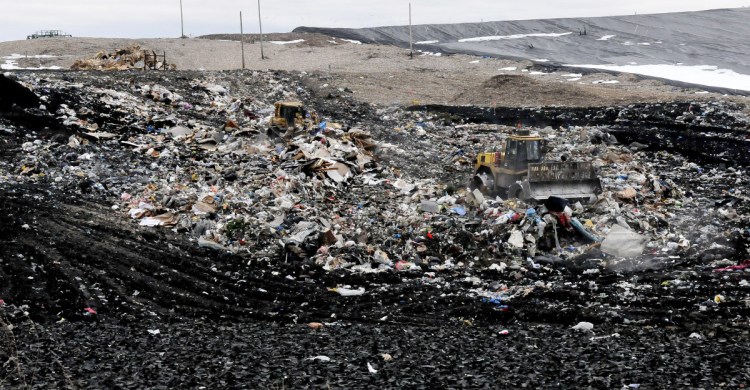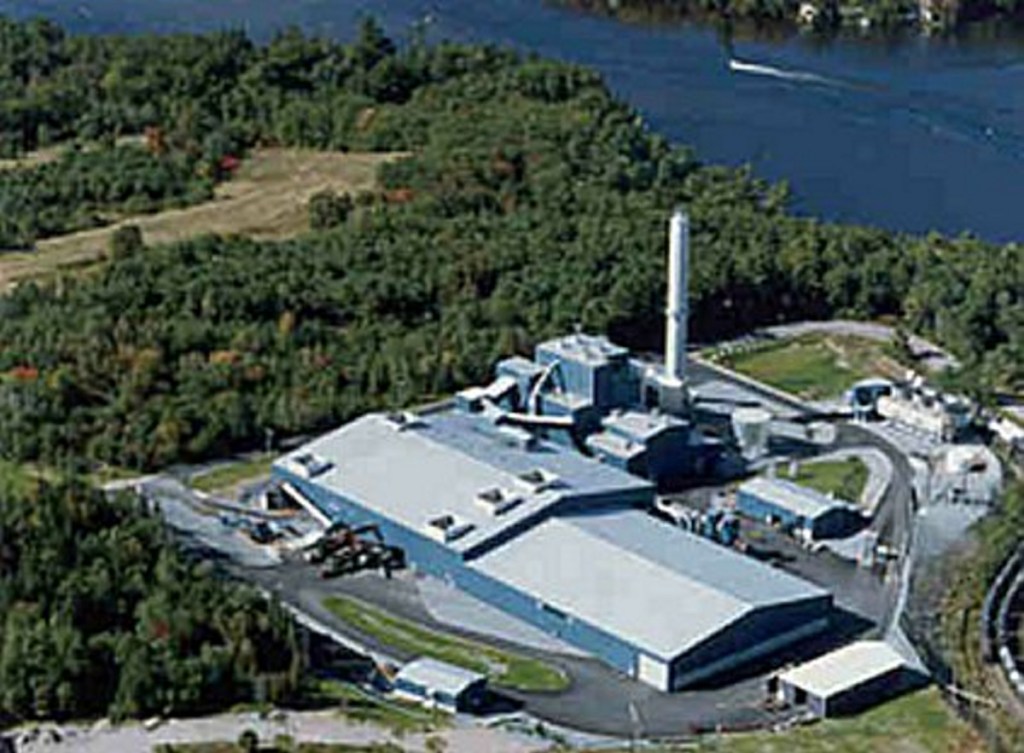ORONO — With the opening of a new waste-to-energy plant in Hampden delayed for months, the organization that represents the more than one hundred towns that joined together to back the new technology will meet Thursday at 10 a.m. to address problems that have arisen with getting rid of waste in the meantime.
Originally slated to open April 1, the Maryland-based Fiberight’s 144,000-square-foot plant is designed to separate recyclables and organic waste, converting the organics into biofuels such as biomethane. However, its recycling operation may not open until September while its conversion process may not be ready until December. The new plant is supposed to be able to process up to 180,000 tons of waste annually through recycling and anaerobic digestion, the process that turns organic material into biofuels.
The delay is forcing the Municipal Review Committee that represents 115 communities in central and eastern Maine to send the waste to two landfills, including one in Norridgewock. Prior to April, those communities were sending waste to the Penobscot Energy Recovery Company in Orrington, a waste to energy plant that burns trash to produce electricity, but that agreement ended when the towns partnered with the MRC, a nonprofit organization that represents the trash disposal interests of the communities. That partnership included an agreement to send their waste exclusively to the MRC and, eventually, to Fiberight.
According to its agenda for the May 31 meeting at 10 a.m., the MRC will address granting members a waiver to allow them to send their municipal solid waste to PERC without defaulting on their agreement to send it to Fiberight. To avoid sending waste to landfills, some towns have violated the agreement and were sending their waste to PERC without a waiver.
Gary Bowman, the town manager of Oakland who sits on the MRC board of directors, said MRC’s plans for the Fiberight plant are the way to go and blames the delay at least partially on PERC.
“We’re trying to do what’s right for the communities,” Bowman said, adding the Fiberight plant was more efficient and cost effective for tax payers than PERC. Unlike PERC, which looks at waste in terms of revenue, he said the MRC serves the communities that signed on with it, and Fiberight’s new technology will be a model for future plants across the country.
“This is the solution,” Bowman said.
Bowman said Oakland bought into the process after listening to the MRC. The town had formed a transfer station steering committee when it was announced the MRC was moving away from PERC to evaluate all the options. The town looked at Fiberight, as well as hauling waste to a landfill and found Fiberight “very promising.” While there has been opposition to Fiberight, he doesn’t believe that is coming from Maine people, but mostly from “big money from trash companies.”
“This is a process that will be very effective,” he said of Fiberight. “It’s cost effective.”
Bowman blamed PERC for the delays, stating that PERC blocked the MRC’s attempts to get Department of Environmental Protection approval for 274 days. PERC didn’t want to lose the investments from the towns, which have grown over the life of the Orrington plant, he said, adding that had PERC not delayed the MRC, the Fiberight plant would be up and running by now.
When Fiberight and the committee received their permits from the Maine Department of Environmental Protection, PERC, along with its managing general partner USA Energy and Exeter Agri-Energy, appealed the state’s decision in Kennebec County Superior Court.
Irene Belanger, a selectwoman from China who is also on the MRC board of directors, said the setbacks did not concern her, since many were due to the harsh winter and major wind storm from last October.
She said China was excited to be “on the cutting edge of something new that we really hope will be such a success to expand into other New England states.”
She said she had not heard any complaints from China residents regarding the Fiberight facility.
“We’re going to be happy to work with the other towns to see whatever we can to make this transpire in as easy a possible manner,” she said. “Even though a little set back on the time, we’ve worked very hard to make sure we can work with all the towns to make it as easy as possible.
“They’re going full speed ahead right now,” she said.
In January the financing of the $70 million Hampden facility was completed, including $45 million from a tax-exempt bond issued by the Finance Authority of Maine, underwritten by Jefferies Group LLC, and $25 million in private equity.
Fiberight’s renewable biofuel technology has not been used large scale in the United States. More than 300 such plants operate throughout Europe. European plants have an additional processing component to make bio-organics, which works separately from the rest of the plant.
Fiberight initially committed to an annual 150,000 tons of waste, but later scaled that number back. Towns that joined the MRC were expected to sign a 15-year contract.
Colin Ellis — 861-9253
cellis@centralmaine.com
Twitter: @colinoellis
Copy the Story LinkSend questions/comments to the editors.





Success. Please wait for the page to reload. If the page does not reload within 5 seconds, please refresh the page.
Enter your email and password to access comments.
Hi, to comment on stories you must . This profile is in addition to your subscription and website login.
Already have a commenting profile? .
Invalid username/password.
Please check your email to confirm and complete your registration.
Only subscribers are eligible to post comments. Please subscribe or login first for digital access. Here’s why.
Use the form below to reset your password. When you've submitted your account email, we will send an email with a reset code.